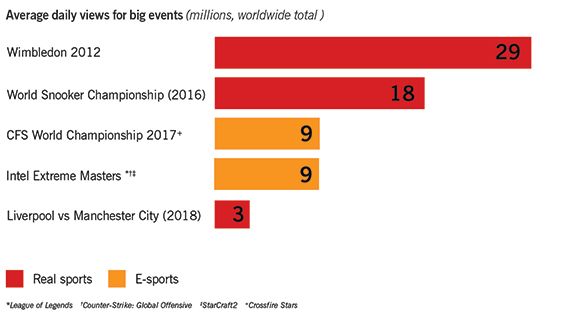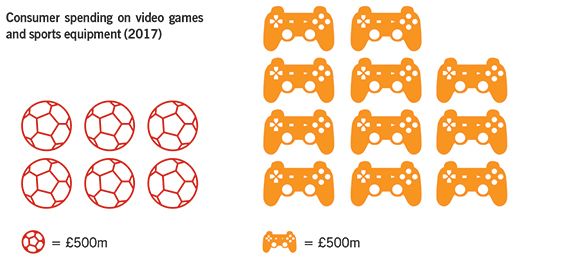There was a time when the term “video games” brought to mind the opposite of glamorous sporting success—the spotty teenage boy bolted up in his bedroom, away from all sunshine and any hope of romance.
But now that millions of youngsters while away hours by watching other people play video games against one another online, yesterday’s joystick warriors have been reborn as heroes of so-called “esports.” Buoyed by a burgeoning games industry with global revenues of $116bn, the virtual sporting elite are giving the stars of track and field a proper run for their money in terms of earnings, audiences and sponsorship deals.
Just as with traditional sports, the best gamers are paid to play everything from arena battle games like League of Legends to simulators of real sports, such as Fifa and Formula 1 series. But the traffic between real and virtual athleticism is no longer just one-way: real-world sports teams such as Manchester City have signed up esports teams in the hope of boosting their brand with the 320m-strong global esports audience. Even the organisers of the 2024 Paris Olympics are said to be interested in including esports as a demonstration event.
On top of a salary of up to £59,000, prize money from tournaments means that the very best esports players can make millions a year. The top earner for 2018, Jesse Vainikka, took home the equivalent of £42,000 per week—almost as much as the average Premier League footballer. Casting a shadow over them all is American Tyler Blevins whose gaming videos on YouTube and streaming platform Twitch made him over £7.5m in 2018.

Esports attract big money because of the millions who gawp at them online, with long-established titles like battle game League of Legends and first-person shooter Counter-Strike often drawing most eyeballs. A daily average of nine million people tuned in each day to watch the five-day-long Intel Extreme Masters Katowice event in Poland in 2017. While that is still well below the equivalent daily figure for big real-world events like Wimbledon, it is three times more than watch even a big Premier League fixture.

Perhaps watching esports athletes and YouTube streamers is leading people to open their wallets a little wider. In 2017, consumers in the UK spent over £5.5bn on gaming equipment, almost double what they spent on sports equipment to get active outdoors.
SOURCES: PROSPECT CALCULATIONS; ESPORTS MARKETING BLOG, STATISTA, WIMBLEDON; UKIE; SPORT ENGLAND












